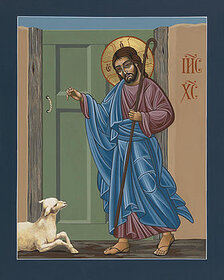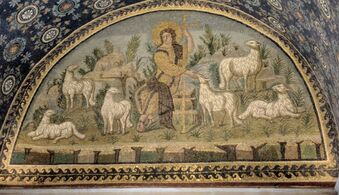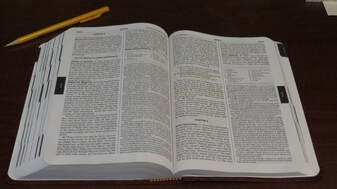 all have great worth to Him all have great worth to Him Whenever I read the parable in the Gospel of Luke about the 100 sheep with the one that wanders off, I usually think about its meaning by considering the Shepherd who went after the one and left the 99. This is often what is emphasized, insofar as Jesus exemplified how much each of us is valued, even the ‘wanderer.’ The message is powerful, filled with the truth of the unfathomable love God has for His children: all have great worth to Him. However, upon reflection my thoughts were drawn to that one wayward sheep; how would I feel if I was the one who had wandered off? Admittedly, I have been that one many times, and if we are honest, we know that everyone shares in this proclivity to wander, not necessarily away from the faith, but into a course of action that has unwittingly moved us away from God through some pattern of sin. And what is it like to be of the 99? Most of the time we are among the faithful flock; but what is important for us to consider is how we have responded to the Shepherd who has subsequently left us to go find the one, and how we have responded to the one who wandered off. We all are members of the one flock, and when all is well, we graze safely. But even in the midst of the flock, if danger is lurking we must be alert, holding fast to our trust in the Shepherd. We are always safe, but it is our responsibility to be vigilant and to stick as close to the Shepherd as we can to let Him guide us through the difficulty.  the lamb knows how to seek out its mother the lamb knows how to seek out its mother It is often said that sheep are stupid animals, but this is not necessarily true. Sheep are fiercely true to their shepherd. Stupid animals would not be able to identify their shepherd to distinguish him or her from the marauder or false shepherd. And if they were stupid they would not trust their shepherd with their lives, follow the instructions given them, or follow where the shepherd leads. Of course, they do need direction, and perhaps that characteristic is the source from which their reputation for being one of the lesser intelligent animals may arise. I have also heard that as with many animals, sheep protect their own; that is, a ewe will protect her lamb, and the lamb knows to seek out its mother if it gets a little disoriented. Therefore, if we are to understand the sheep symbolism that Jesus used in His parables, we must recognize that part of what He was saying is that as spiritually mature people we have a responsibility to remain alert and make choices based on that which the Shepherd has taught. He will lead us, but like the sheep in this story, we have the freedom to stay or to wander. He stays close, but He also provides the tools we need so that we can make mature, Spirit-filled decisions. Whether we sense His presence or not, the Shepherd is aware of our every movement, although sometimes for reasons unknown to us He seems to stay hidden so that, in freedom, we can use the gifts He has given to find our way back to Him.  a Shepherd would do anything to protect the flock a Shepherd would do anything to protect the flock Jesus used the image of being a shepherd because the people of His day could relate to it. Shepherding was a viable way to ‘make a living,’ but it was an occupation for those who were usually poor. Therefore, choosing to describe Himself as a shepherd could be seen as an odd choice; shepherds were looked down upon as unsavory at best, and totally reviled at worst, because they could not go to the Temple to fulfill the requirements of the Law. They had difficulty keeping the Sabbath and were often considered unclean, given that they did not have time for the rituals required in the cleanliness laws due to the demands of maintaining flocks. Shepherds simply could not walk away from their sheep, expecting the flock to be safe in their absence; there were no days off for a shepherd. But for Jesus the reference to Himself as a shepherd was deliberate and fitting: He knew He would be reviled as one who ‘broke the Law,’ not applying it literally, but teaching and living its spirit through love and mercy. He also knew that just as a shepherd would do anything to protect the flock, He would do the same, eventually laying down His life for His sheep.  grazing safely grazing safely To understand this parable on a deeper level, it would be good to pray with it by composing Midrash. Midrash is the consideration of a story from the point of view of each of the ‘characters’ within it, delving into what their particular experience may have been like.* In this case, we can put ourselves into the shoes (hooves?) of one of the sheep among the 99 and then of the sheep that strayed. We can also imagine what the Shepherd may have been thinking. Praying with the passage in this way will open us up to more insights into what Jesus is trying to communicate to each of us (uniquely) in this present moment. Our earthly journey is perilous, filled with many rocky paths, enemies of the Shepherd who are therefore hostile to us, and precipices from which we can fall. Hopefully, as we pray, we will grow in trust for Jesus our Good Shepherd, ‘grazing’ safely by partaking in His Body and Blood for sustenance, knowing He is always present to offer protection, guidance, love, and mercy to the flock He loves.  may we like sheep safely graze may we like sheep safely graze May we learn to trust in Jesus, our Good Shepherd more deeply! May we graze continually, feeding our souls on the Body and Blood of Jesus that we may grow in love and mercy! And may we, like sheep, safely graze in the Kingdom of Heaven one day! Let us meet in the pasture of the Lord! Peace! ©Michele L. Catanese Note: The musically inclined will have caught the reference to a beautiful, often performed piece of music by Johann Sebastian Bach called “Where Sheep May Safely Graze.” It was running through my head the entire time this entry was being written. It has been transcribed for just about every instrument you can imagine, but here is one version I particularly love, performed on classical guitar by Christopher Parkening: https://www.youtube.com/watch?v=mZuNr8r7yV0 *Midrash was mostly used by Jewish scholars as a commentary to explain a passage more deeply. It was a way of thinking that would break open a passage by considering it from different angles, so to speak. Here, I am adapting the concept as a way of praying with a passage, so that the one who prays can unpack the parable for deeper understanding of what Jesus was revealing through each of the ‘characters,’ given that we know that every word Jesus spoke had great meaning. (My suggested application is similar to, -or rather I have derived it from- the way St. Ignatius would have one pray using the imagination.) Images: 1. My photo, sheep grazing, taken in New Zealand. 2. My photo, lamb wandering, taken in Scotland. 3. Icon, El Buen Pastor by Fr. William Hart McNichols. You can find this at fineartamerica.com/featured/el-buen-pastor-188-william-hart-mcnichols.html 4. Painting, Landscape from Saint-Rémy, (1889) by Vincent van Gogh. 5. My photo of a mosaic of Jesus as the Good Shepherd. This is in the San Vitale Cathedral in Ravenna, Italy. Note: In compliance with GDPR rules, I wish to make it clear that I do not gather any information on any of my readers at any time.  To the ends of the earth To the ends of the earth We have heard that actions speak louder than words, which of course, is true. It is said that over 95% of the way we communicate is through our gestures, expressions, body language, and how we act. But what we say and how we say it, does have power; our words can inflict great damage, offer long-sought healing, shed enlightenment or insight, or lead someone to truth. The logical conclusion is to make sure we match what we say with what we do, and indeed, that is our goal. Words can be tricky, and often what we intend can be misinterpreted, even for the best of communicators, since all of us are ‘biased hearers’ formed by our past experiences or understanding. For help with how we might use our words and deeds rightly we can look to the clear teaching found in the gospel message of Jesus. Certainly what He taught should influence the way we use words, especially since He said that we should do all things with love, and that what we say can reveal what is in our hearts. This is not to minimize the effect of our actions, but it is important to also consider what we say since words are also a means of evangelization. Jesus instructed His followers to bring the Good News ‘to the ends of the earth,’ (Matt 28:19; Mark 16:15) thus, it is important to consider the ‘tools’ we use.  Jesus Christ is the very Word of God Jesus Christ is the very Word of God Words convey meaning and intention. The intention of God was revealed when He sent His Son Jesus, who is the very Word of God; that is, Jesus is not only the ‘means,’ but He is the message. It is not an exaggeration that St. John the Evangelist referred to Jesus as the Word: in Jesus, God communicated His unfathomable love, and as a result everything Jesus said and did revealed God and His desire for us. (John 1:1-11) Because this is true, our words should give witness to the One whom we profess to follow. Therefore, what defines a person as a disciple is not only what they do, but also what they say since His followers are bearers of Christ to the world in every way. If we profess to be followers of Jesus, our words should be a way to evangelize, teach, heal, make peace, encourage, and even to lovingly correct. Words can also do the opposite if we are not careful, and the damage done by ill-placed words spoken in anger, for example, can last a lifetime.  A small fire can set a huge forest ablaze A small fire can set a huge forest ablaze On one occasion when refuting the Pharisees who were attempting to discredit Him, Jesus said that it is not what goes into a person that defiles them, but what comes out. (Matthew 15:11) That is, our words do matter, and reveal not only our intentions, but also what is really within our hearts. In his letter St. James elaborated on what he learned from Jesus, warning that “the tongue is a small member, yet has great pretentions. Consider how small a fire can set a huge forest ablaze.” (James 3: 5) He went on to say: “from the same mouth come blessing and cursing. This need not be so….” (3:10) In other words, we have to learn to tame what comes out from us so that we are instruments of edification and of peace. We all know that words can slip out and hurt others; most likely more than once in our lives we have wished we could go back in time to retract something we said. We also know what it is like to be on the receiving end of words that cut to the core with hurt that can resonate through the years. The goal for us is to learn to tame our tongue, something which requires grace and is therefore attainable, but only if combined with our desire, prayer, and effort.  ...reading, praying with, and reflection upon the gospels ...reading, praying with, and reflection upon the gospels In order to follow Jesus and to conform ourselves to that which God has called us to do we must continually discern what we do and what we say. To ensure we speak and act with love, it is essential to stay connected to Jesus, the Word, particularly through time spent reading, praying with, and reflecting upon the gospels as well as in the private, silent prayer of dialogue with Him. We need to be specific as to what graces we ask of the Holy Spirit, such as self-control, patience or whatever is needed so that we use words to build up rather than to tear down. It would be good to do an examination of conscience, or as St. Ignatius taught, an examination of consciousness, each night before we go to bed to discern what the areas are in which we need the help of the Holy Spirit.* If we ask, we will receive, but we need to be consistent in our efforts so that even when we struggle with it, (and we will), we can continue to trust in the power of God’s love and His desire to help us grow.  ... as we conform our will to His ... as we conform our will to His The process of learning how to speak the love of God so that our words are consistent with our actions will help us become more attentive to Jesus, to consider what He would have us say and do. In turn this gives Him the opportunity to let His forgiveness and love wash over us. Our hearts will soften and change as we conform our will to His and invite Him to show us the way to proceed. Let us become beacons of the Word, glorifying Him with our lives. May we desire to unite our words and deeds as instruments of evangelization and love! May we let the Holy Spirit teach us so that we speak words of love, especially in difficult situations! May we utilize the gifts of wisdom and discernment that we might speak the Word at all times! And may we glorify God as we grow in our discipleship! Let us meet in the Heart of Jesus! Peace! ©Michele L. Catanese * In the Spiritual Exercises of St. Ignatius Loyola there is something called the Examination of Consciousness, often referred to by Jesuits as the Examen. A simple way to do this nightly examination is to address God the Father by mentioning the ways you responded to His gifts and graces throughout the day, and offering gratitude. Then address the Son, Jesus, mentioning the ways you failed to respond, perhaps in ways you sinned, asking for His forgiveness. Then address the Holy Spirit, asking for the appropriate grace to help with one of the patterns of sin you see, based on what you asked pardon for. This should take only a few minutes and is not meant to be a ‘fine tooth comb’ sort of thing such as we do before Reconciliation. Simply mention what comes up in a moment or two of reflection. Images: 1. My photo, Matagorda Bay, TX. 2. Icon, Cristo Pantocrator by Fr. William Hart McNichols. If you are interested in obtaining a copy you can purchase it in one of many mediums at https://fineartamerica.com/featured/cristo-pantocrator-175-william-hart-mcnichols.html. 3. My photo, volcanic activity from Kilauea, Volcanoes National Park, Hawaii (the Big Island of Hawaii). I chose this because it shows the destructive force of lava, which also builds up the island; therefore it both builds up and tears down. 4. My photo, my Bible. 5. Watercolor, Self Portrait, by John Absolon, (1815-1895) Note: In compliance with GDPR rules, I wish to make it clear that I do not gather any information on any of my readers at any time. |
Heart Speaks to Heart
|

 RSS Feed
RSS Feed

